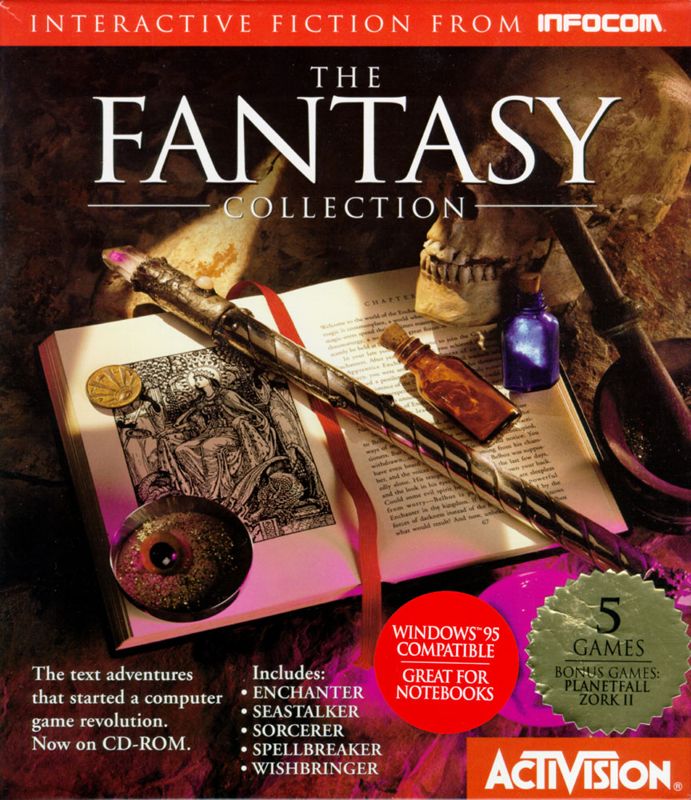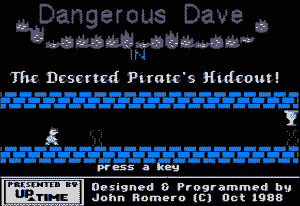Retro Replay Review
Gameplay
The Fantasy Collection shines as a gateway into Infocom’s golden era of interactive fiction, immersing players through a robust text parser that understands a wealth of natural language commands. Rather than relying on point-and-click mechanics, each title—from the marine mystery of Seastalker to the magical trials of Enchanter—challenges you to think creatively, explore meticulously, and experiment with verbs, nouns, and phrases until the perfect command unlocks the next secret.
(HEY YOU!! We hope you enjoy! We try not to run ads. So basically, this is a very expensive hobby running this site. Please consider joining us for updates, forums, and more. Network w/ us to make some cash or friends while retro gaming, and you can win some free retro games for posting. Okay, carry on 👍)
Players familiar with modern adventure games may be surprised by the depth of these text adventures, where every item you pick up, examine, or combine can dramatically shift the narrative. Wishbringer’s enchanted stone serves as a playful tutorial, gently introducing you to puzzle logic, while the more complex puzzles of Sorcerer and Spellbreaker demand careful note-taking, mapping, and lateral thinking. Planetfall and Zork II on CD-ROM add bonus scenarios that expand the range of puzzles—from mechanical robots to subterranean mazes—ensuring a varied experience throughout.
The user interface on Windows and Macintosh systems provides a convenient split window: one for the text transcript and one for your input line, making it easy to scroll back through descriptions and hints. For purists, the DOS mode replicates the authentic feel of 1980s computing, complete with monospaced fonts and minimal distractions. Whether you choose modern Windows or classic DOS, the gameplay remains faithful to Infocom’s motto: “Today’s parser is tomorrow’s Hogfather.”
In cooperative or solo sessions, the pacing is entirely up to you. There’s no game-over screen in the traditional sense—mistakes are often reversible, but some puzzles can become unwinnable if approached too hastily. This risk-and-reward balance heightens tension, turning every new room or cryptic poem into a potential triumph or setback that will have you reaching for the hint sheet (or digital manual) to press on.
Graphics
True to its text-driven heritage, The Fantasy Collection employs minimal graphics, relying on evocative prose rather than elaborate visuals. On Windows and Macintosh platforms, you’ll find tasteful interface elements—borders, title screens, and occasional static illustrations—that frame the narrative without overshadowing your imagination. These touches serve more as nostalgic flourishes than core attractions.
When running in DOS, the collection fully embraces monochrome or CGA color palettes, depending on your system settings. While these retro looks may appear dated compared to modern RPGs, they enhance the sense of exploring uncharted territory through raw text. The absence of flashy graphics directs your focus inward, compelling you to visualize enchanted castles, undersea labs, or alien spaceships from the vivid descriptions alone.
Each adventure’s cover art and in-game hints are presented as scanned images in the CD-ROM version, preserving the original feel of Infocom’s packaging. Whether you’re clicking through a digital image of the Wishbringer stone or examining a map from Zork II, these assets add authenticity and charm. The result is a visual experience that feels true to the era, nurturing nostalgia without pretending to be high-resolution cinema.
For modern gamers concerned about readability, fonts are crisp and scalable on both Mac OS and Windows systems. You can adjust window sizes, scrollback history, and text colors to suit your eyes. In short, while The Fantasy Collection won’t impress graphic purists, it delivers a clean, functional interface that complements its text-only gameplay perfectly.
Story
The narrative scope of The Fantasy Collection spans oceans, enchanted realms, underground empires, and futuristic starships. In Seastalker, you assume the role of a naval investigator unraveling a marine monster mystery, blending detective work with sci-fi twists. Wishbringer casts you as a postal worker in a sleepy village, tasked with returning a magical gem to its rightful owners—an accessible introduction that conceals hidden depths.
As you advance to Enchanter, Sorcerer, and Spellbreaker, the stakes escalate to world-shattering levels: you must thwart malevolent wizards, master spells, and ultimately face Morgoth himself to save the floating realm of Dalorm. Infocom’s trademark wit and intricate worldbuilding shine through in every room description, puzzle prompt, and NPC interaction, offering a cohesive epic that plays out across four linked sequels.
Beyond the five core titles, the bonus adventures Planetfall and Zork II provide refreshing genre detours. Planetfall’s poignant tale of isolation and friendship with an endearing robot companion offers an emotional counterpoint to high-fantasy challenges. Zork II plunges you into the labyrinthine depths of the Great Underground Empire, blending archaic humor with ever-complicated treasure hunts.
Overall, the storytelling in The Fantasy Collection is a masterclass in text-only engagement. Without voice acting or cutscenes, Infocom relies on your active participation to bring each world to life. The result is an immersive tapestry of narrative threads, memorable characters, and environmental puzzles that feel handcrafted and deeply rewarding.
Overall Experience
The Fantasy Collection stands as a testament to Infocom’s legacy, delivering seven quintessential interactive fiction titles on a single CD-ROM. Compatibility with Microsoft Windows, DOS, and Apple Macintosh ensures that both retro enthusiasts and newcomers can explore these classics with ease. Installation is straightforward, and the bundled hint sheets, maps, and feelies (digital replicas of original physical extras) enrich the overall package.
Value for money is exceptional: you receive five mainline fantasy adventures plus two beloved bonus games, all retailing at a price comparable to a standard modern release. The learning curve is gentle for novices, thanks to Wishbringer’s tutorial-style puzzles, yet the later games maintain enough complexity to challenge veteran text-adventurers. Save states and adjustable scrollback windows help bridge the gap between classic and contemporary playstyles.
Replaying these titles is equally satisfying, as discovering alternate solutions or revisiting favorite puzzles never grows old. Whether you’re hunting a sea creature, casting eldritch spells, or befriending a plucky robot, the sense of wonder and discovery remains intact. The CD-ROM interface feels modern enough without diluting the purity of Infocom’s text adventures.
In summary, The Fantasy Collection is an essential anthology for fans of storytelling, puzzle design, and retro gaming. Its diverse settings, sharp prose, and carefully crafted puzzles coalesce into an experience that honors the roots of interactive fiction while remaining accessible to today’s audiences. For anyone seeking immersive, brain-teasing adventures unencumbered by graphical excess, this collection is a must-own treasure.
 Retro Replay Retro Replay gaming reviews, news, emulation, geek stuff and more!
Retro Replay Retro Replay gaming reviews, news, emulation, geek stuff and more!




Reviews
There are no reviews yet.